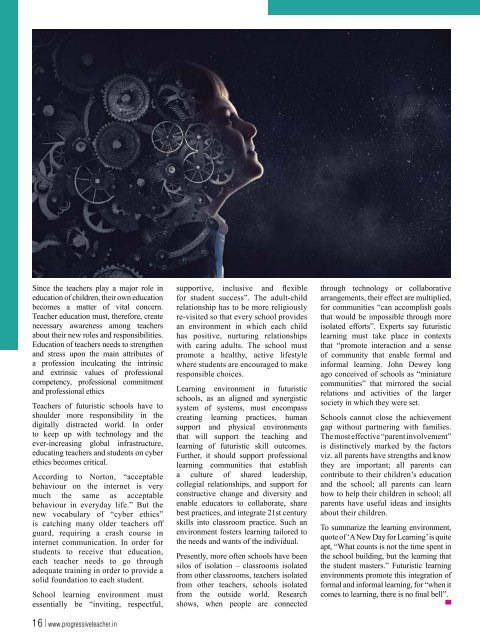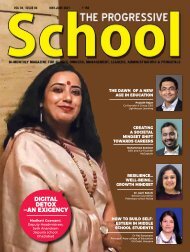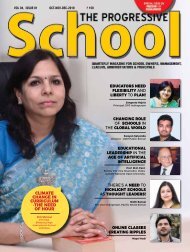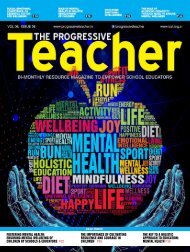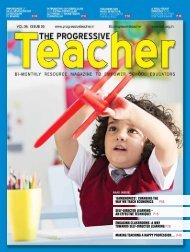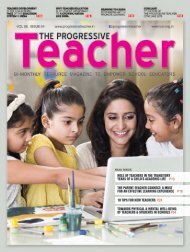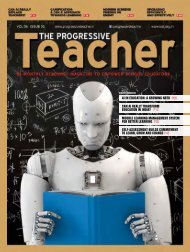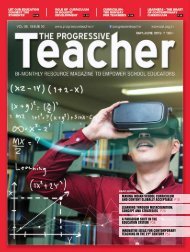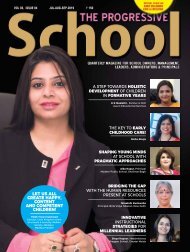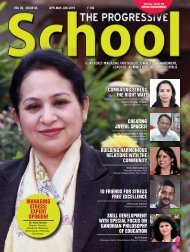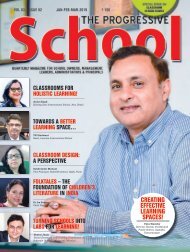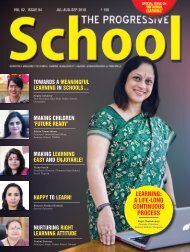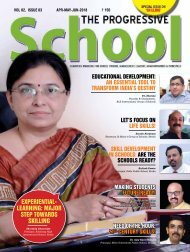The Progressive Teacher Vol 06 Issue 01
This issue of The Progressive Teacher focuses on "Futuristic School Cultures". In addition to articles by educators and school leaders, this issue introduces several new features including "World Education News", "Career Tips", "Photo Feature", and "Festivals of the World". Happy Reading!
This issue of The Progressive Teacher focuses on "Futuristic School Cultures". In addition to articles by educators and school leaders, this issue introduces several new features including "World Education News", "Career Tips", "Photo Feature", and "Festivals of the World". Happy Reading!
You also want an ePaper? Increase the reach of your titles
YUMPU automatically turns print PDFs into web optimized ePapers that Google loves.
Since the teachers play a major role in<br />
education of children, their own education<br />
becomes a matter of vital concern.<br />
<strong>Teacher</strong> education must, therefore, create<br />
necessary awareness among teachers<br />
about their new roles and responsibilities.<br />
Education of teachers needs to strengthen<br />
and stress upon the main attributes of<br />
a profession inculcating the intrinsic<br />
and extrinsic values of professional<br />
competency, professional commitment<br />
and professional ethics<br />
<strong>Teacher</strong>s of futuristic schools have to<br />
shoulder more responsibility in the<br />
digitally distracted world. In order<br />
to keep up with technology and the<br />
ever-increasing global infrastructure,<br />
educating teachers and students on cyber<br />
ethics becomes critical.<br />
According to Norton, “acceptable<br />
behaviour on the internet is very<br />
much the same as acceptable<br />
behaviour in everyday life.” But the<br />
new vocabulary of “cyber ethics”<br />
is catching many older teachers off<br />
guard, requiring a crash course in<br />
internet communication. In order for<br />
students to receive that education,<br />
each teacher needs to go through<br />
adequate training in order to provide a<br />
solid foundation to each student.<br />
School learning environment must<br />
essentially be “inviting, respectful,<br />
supportive, inclusive and flexible<br />
for student success”. <strong>The</strong> adult-child<br />
relationship has to be more religiously<br />
re-visited so that every school provides<br />
an environment in which each child<br />
has positive, nurturing relationships<br />
with caring adults. <strong>The</strong> school must<br />
promote a healthy, active lifestyle<br />
where students are encouraged to make<br />
responsible choices.<br />
Learning environment in futuristic<br />
schools, as an aligned and synergistic<br />
system of systems, must encompass<br />
creating learning practices, human<br />
support and physical environments<br />
that will support the teaching and<br />
learning of futuristic skill outcomes.<br />
Further, it should support professional<br />
learning communities that establish<br />
a culture of shared leadership,<br />
collegial relationships, and support for<br />
constructive change and diversity and<br />
enable educators to collaborate, share<br />
best practices, and integrate 21st century<br />
skills into classroom practice. Such an<br />
environment fosters learning tailored to<br />
the needs and wants of the individual.<br />
Presently, more often schools have been<br />
silos of isolation – classrooms isolated<br />
from other classrooms, teachers isolated<br />
from other teachers, schools isolated<br />
from the outside world. Research<br />
shows, when people are connected<br />
through technology or collaborative<br />
arrangements, their effect are multiplied,<br />
for communities “can accomplish goals<br />
that would be impossible through more<br />
isolated efforts”. Experts say futuristic<br />
learning must take place in contexts<br />
that “promote interaction and a sense<br />
of community that enable formal and<br />
informal learning. John Dewey long<br />
ago conceived of schools as “miniature<br />
communities” that mirrored the social<br />
relations and activities of the larger<br />
society in which they were set.<br />
Schools cannot close the achievement<br />
gap without partnering with families.<br />
<strong>The</strong> most effective “parent involvement”<br />
is distinctively marked by the factors<br />
viz. all parents have strengths and know<br />
they are important; all parents can<br />
contribute to their children’s education<br />
and the school; all parents can learn<br />
how to help their children in school; all<br />
parents have useful ideas and insights<br />
about their children.<br />
To summarize the learning environment,<br />
quote of ‘A New Day for Learning’ is quite<br />
apt, “What counts is not the time spent in<br />
the school building, but the learning that<br />
the student masters.” Futuristic learning<br />
environments promote this integration of<br />
formal and informal learning, for “when it<br />
comes to learning, there is no final bell”.<br />
16| www.progressiveteacher.in


